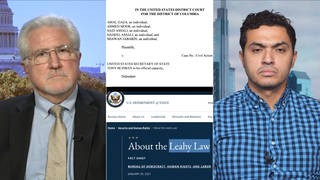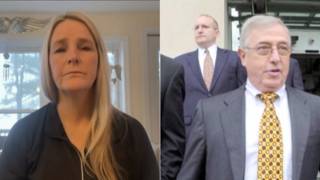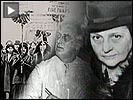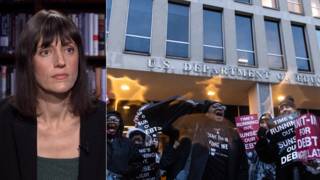
Related
Guests
- Charles Kernaghandirector of the Institute for Global Labour and Human Rights (formerly the National Labor Committee).
- Annelise Orleckprofessor at Darmouth College and author of the book Common Sense and a Little Fire: Working Class Women’s Activism in the 20th Century U.S.
- Steve Fraserauthor, editor and labor historian. His many publications include the award-winning book Labor Will Rule: Sidney Hillman and the Rise of American Labor. The book won the Philip Taft Prize for the best book in labor history. Fraser currently teaches at New York University.
One hundred years after the Triangle Shirtwaist Factory fire, we look at some of the major struggles facing workers today in the United States and around the world. In one of many recent fires, 26 workers making clothes for U.S. companies were killed in Bangladesh last December. Workers across the United States, meanwhile, are facing a resurgent assault on salaries, benefits and their right to organize—as epitomized in Wisconsin’s anti-union bill. [includes rush transcript]
Transcript
AMY GOODMAN: “Mayn Rue Platz (My Resting Place),” Corinne Reif of The Mór Rigan’s Wake singing a modern Yiddish song set to images of the tragic Triangle Shirtwaist Factory fire that took place March 25th, 1911, a hundred years ago today. This is Democracy Now!, democracynow.org, The War and Peace Report. I’m Amy Goodman, with Juan Gonzalez. Juan?
JUAN GONZALEZ: Well, to mark the hundredth anniversary of the Triangle Shirtwaist Factory, the Institute for Global Labor and Human Rights has published a new report titled “Triangle Returns: Who Will Protect Today’s Working Girl?” The Institute also produced this video to accompany the report. It’s narrated by Charles Kernaghan.
CHARLES KERNAGHAN: On December 14th, 2010, just three months shy of the hundredth anniversary of the Triangle Shirtwaist Factory fire in New York, a fire broke out at the Hameem factory in Bangladesh on the outskirts of Dhaka. It was an 11-story building. It was lunchtime. There were workers in the cafeteria on the 11th floor, and they started to smell smoke. They didn’t panic. They did just what the workers did at Triangle: they started to go towards the exit. The workers tried to get out the exit, and the flames were so great and the smoke was so dense that they had to retreat. They ran through the cafeteria to the other side of the building, the west side, and they tried to go out the fire exits, and the exit doors were locked. They were trapped.
Those workers jumped off the top of the building from the 11th floor. They leapt off the building for the same reason, so that their parents could have their bodies and they could be mourned correctly and they could be buried correctly. Workers on the ground thought these were bales of clothing that were being thrown out the windows.
It’s word for word the exact same thing. At the Triangle factory, the exit door was locked. The exit door was locked at Hameem, a hundred years later at the factory fire at Hameem in Bangladesh. And do you know what the workers told us? They said that, often, management locks the exit gates during a fire so that the garments can’t be stolen. Twenty-nine workers were killed. Over a hundred workers were injured, 36 of them seriously and were hospitalized. The management paid the families of the deceased workers $2,080 as compensation. That’s what a life is worth in the developing world now.
This is going on, still, in the global economy today. Not one change. In fact, it gets worse. In Triangle they made 14 cents an hour. But when you adjust that for inflation, that 14 cents an hour in 1911 is worth $3.18 today. The workers at the Hameem factory in Bangladesh on the outskirts of Dhaka, they’re making, at the top wage, 28 cents an hour. That means that their earning, their wages in Bangladesh today, are one-tenth of what wages were in the United States 100 years ago. We are racing to the bottom.
AMY GOODMAN: Charles Kernaghan, director of the Institute for Global Labour and Human Rights, formerly the National Labor Committee, now based in Pittsburgh.
Talk more about this, Charlie. Those images are incredible.
CHARLES KERNAGHAN: Well, it’s eerily similar to the Triangle Shirtwaist Factory fire. And the workers in Triangle were working 14 hours a day. At the Hameem factory in Bangladesh, they work 12 to 14 hours a day, but they work seven days a week. The Triangle workers got one day a week off.
The owner of the factory, a very powerful man, he just — after the fire, he said that it was sabotage on the part of the workers. He owns a newspaper, and he owns a television station. So, without the slightest bit of evidence, he just says it was sabotage.
And so, so different from the Triangle factory, there’s been no investigation. There’s been — nothing comes out of it. The workers have just died. In Bangladesh, the workers — last summer, we were there in July — they went out on protests for a wage increase. They were begging, demanding for 35 cents an hour. Imagine that, Walmart and Gap and the rest of the companies. They were begging, demanding, marching.
AMY GOODMAN: What do you mean, Walmart and Gap?
CHARLES KERNAGHAN: Well, because these are all the labels that produce there. In this particular factory, it was Gap children’s, toddler’s pants that were being sewn in the factory. They accounted for 50 percent of the production. Four hundred thousand pairs of Gap pants were burned in the fire. So, Gap was a major player. So was Phillips-Van Heusen and JCPenney, some Abercrombie & Fitch and a little bit of Target. But what — so these were all the major labels produced there.
Bangladesh right now exports $4 billion worth of apparel to the United States each year, and they’re the third-largest exporter. Ninety-seven percent of all garments are made offshore now. So, in other words, what we’ve done is we’ve taken the sweatshops from, you know, 1911, and we’ve just moved them to Bangladesh.
Now, when the workers in Bangladesh started to fight back — there’s three-and-a-half million workers, garment workers, 80 percent of them young women. When they fought back and they demanded a 35-cent-an-hour wage, which any corporation could easily pay, they were attacked by the police. They were beaten, they were clubbed, they were shot at with rubber bullets, they were hosed down with these very powerful water cannons, which just swept the women off the streets. And they put a dye in the water so they could be arrested later on, so they couldn’t get the dye off their clothing or their bodies. And this is — we are racing so fast backwards in the global economy that right now these workers, you know, don’t stand a chance.
JUAN GONZALEZ: Well, Charlie, I want to ask you specifically, because you mentioned this question of all of the production being sent offshore. We’re constantly told that we’re living in a post-industrial society and that manual labor is no longer the thing that drives the economy, when the reality is that there are more industrial workers in the world today than there ever were. It’s just that they’re not as much in the advanced countries, and basically the worst aspects of capitalism have been outsourced offshore to these other — to these other countries. And yet, we believe that we live in a post-industrial society, and we act as if all the goods that we have around us just somehow appeared and weren’t made by someone somewhere in some factory, as you say, with conditions even worse than they were here in the early 20th century in the United States.
CHARLES KERNAGHAN: And what’s so incredible is that it’s going on in broad daylight. That struggle in Bangladesh with three-and-a-half million garment workers, 80 percent of them young women, that may have been the largest social justice struggle in the history of the world on the part of women, but no one even knew about it. It’s out of sight, it’s out of mind. And this is going on in China. It’s going on in Vietnam.
It’s — right now, we’re calling for legislation that would say to the U.S. companies, because we can only deal here with the United States, that you can make your products anywhere in the world — we believe in fair trade — but if that product is made by a child or if it’s made by a young woman forced to work 15 hours a day, seven days a week, who’s stripped of their rights and paid pennies an hour and doesn’t have the right to organize, that product will not be able to enter the United States, and that product won’t be sold in the United States, and that product won’t be exported from the United States. And so, we’ve introduced some legislation in the Congress — in the 110th Congress we introduced it. We ended up getting 175 co-sponsors in the House and 26 in the Senate, including at that time Senator Barack Obama, Hillary Clinton and Joe Biden. And then it just ran out of steam. The companies saw what we were doing and moved in, and the thing was shut down. But if we don’t take some control over the global economy, we’re all going to be working for $3.18 an hour, without a doubt, with no benefits. I mean, we’re going downhill so fast, it’s remarkable.
AMY GOODMAN: Professor Steve Fraser, at the beginning of this broadcast, you talked about the protests in the United States right now, this issue of public unions. I wanted to play a clip of the Wisconsin Governor Scott Walker’s comments on March 11th, when he signed the anti-union legislation law. He told reporters he hopes Wisconsin will inspire other states to pass similar laws.
GOV. SCOTT WALKER: For us, we’re doing this to lead the way in our own state, to get Wisconsin working again. But if along the way we help lead a movement across the state to pass true fiscal reform, true budgetary reform, to ultimately inspire others across this country, state by state, and in our federal government, inspire others to stand up and make the tough decisions so that they too make a commitment to the future, so that our children, in all states and across the country, ultimately don’t have to face the dire consequences we face, because previous leaders have failed to stand up and lead, I think that’s a good thing and a thing we’re worthy — we’re willing to accept as part of our legacy.
AMY GOODMAN: Professor Steve Fraser, the significance of this?
STEVE FRASER: Yeah, this is a call to arms, and it’s a call to arms that’s been going on now for some time and has become more militant of late, fueled by the energy of the Tea Party. And that is to sort of repeal the 20th century, to do what the Maine governor proposed to do, to erase all that history and all those accomplishments, and particularly to eliminate that critical right to engage in collective bargaining, and to return to the Dark Ages, to this Darwinian capitalism that existed at the time of the fire and that exists all over the world today, as Charles was just describing.
So it’s an extremely dangerous moment in the country’s history right now, because what he’s proposing we do — and what has already been going on here in America — is a kind of auto-cannibalism, a kind of eating away at the welfare of working people, that’s gone on for the last generation, so that, soon enough, we, too, will be making exactly what those Bangladesh workers will be making. The safety net will be shredded and then — and eviscerated and be gone. And the general level of well-being in this country will be destroyed, if we don’t now mobilize, as people in Madison and elsewhere have begun to do, against this assault.
JUAN GONZALEZ: Well, Steve, I know I mentioned this earlier, but I’d like to focus on this, because often it’s not fully understood that —- what collective bargaining represents, because I’ve worked in both union and non-union places. And in a non-union place, it’s basically you, and whatever the boss says, that’s what happens. You have no rights -—
STEVE FRASER: Yeah.
JUAN GONZALEZ: — in the normal workplace, other than the basic federal rights that are guaranteed by Congress. But you basically have no right to bargain about how your labor is going to be used, what kind of conditions you’re going to work under, you know, what kind of increases you’re going to have, whether you’re even going to have your job, and — so that collective bargaining, in my mind, really represents a form of democracy in the workplace.
STEVE FRASER: Yes.
JUAN GONZALEZ: Without it, you have dictatorship in the workplace.
STEVE FRASER: Yes, you have industrial autocracy. You have what you had back at the time of the fire, where there’s — where you’re employed at will, and the sanctity of private property allows the employer to treat you in any way he chooses to, whether that’s about firing and hiring, whether it’s about the rate at which you work, the amount at which you work, what he pays you, the hours of work. And it means you have no voice, no voice in all of those circumstances that determine your fate. So it’s a fundamental democratic right and human right. Collective bargaining has been understood that way through a good part of the 20th century because of the Triangle fire and what followed it. And we can’t lose it. It’s too precious.
AMY GOODMAN: Professor Annelise Orleck, you are a professor of women’s history and immigrants’ history. This is about women and immigrants, the lessons we learn from Triangle and where we stand today.
ANNELISE ORLECK: And I hope that this discussion around Triangle and our evocation of the strong spirits of these young women, who fought for their rights before Triangle, who died at the fire, and who continued to fight afterwards, will help us to humanize the women in Bangladesh, the nurses in Madison, Wisconsin, the domestic workers in New York City, all of whom we have a little bit of a harder time giving full blood and flesh and voice to. And that’s my deepest hope about this anniversary of the fire, is that it will allow us to bring those voices into the conversation.
AMY GOODMAN: And where we stand in immigrant rights issues today?
ANNELISE ORLECK: Yes, because, of course, the hiring of undocumented workers in the United States in low-wage work allows employers to have complete free will over the conditions under which people labor. And some of the conditions under which domestic workers, in particular, who are so often undocumented labor, are equivalent to slavery. I have had stories of people literally shackled in the basement and, you know, people forced to work 14 hours a day, not in Bangladesh, but in Manhattan. And so, I think that there’s a direct relationship between the rights of immigrants, to come here and to be protected by American labor legislation and minimum wage laws and maximum hours and safety laws, and the future of American labor and the prevention of future Triangles.
JUAN GONZALEZ: Charlie, I’d like to ask you, since you’ve — during both the first Bush administration, the second Bush administration and the Clinton administrations, you exposed what American companies were doing, especially with their subcontractors, their producers abroad. What’s been going on with the Obama administration in terms of what kind of safeguards it’s tried to negotiate in any of these free trade agreements that it’s been — it’s continuing to push forward? Do you see any difference under Obama than what’s happened in the past?
CHARLES KERNAGHAN: A slight difference. But, for example, the U.S.-Jordan Free Trade Agreement descended into human trafficking. They stripped guest workers of their passports. They were treated like slaves. They weren’t paid. They were working 16 hours a day. And all the garments were coming in duty-free to the United States or Guatemala. It’s out of control, in terms of labor rights and in terms of paying the workers decent wages — and legal wages. It’s happening all throughout the U.S.-Central America Free Trade Agreement. So, the improvements have been very slight. But a lot of people are putting a lot of pressure on the administration to get off their seats and get up and start to do something concrete.
AMY GOODMAN: And the response of companies like the Gap when it comes to a fire in Bangladesh?
CHARLES KERNAGHAN: Well, you know, the American people have to understand that this economy also belongs to the American people and not just the corporations. So, right now the corporations have all the laws they need to protect their products. They have intellectual property rights and copyright laws, so if you make a knockoff of Barbie Doll or something like that or Microsoft, you’re going to go to jail. You’re never going to work again. You’ll go to prison. They’ll shut you down. But when we said to the companies, we said, “Look, you have laws to protect, you know, your products,” they said, “Yes, we need a level playing field on the global economy.” So we said, “OK, can’t we have similar laws to protect the rights of the human beings, the 16-year-old woman in Indonesia who make Barbie Doll? Can’t we protect her rights, as well?” They said, “No, that would be an impediment to free trade.” So the American people allow corporations to have laws to protect their trademarks and their products, but we can’t have laws to protect the rights of human beings. Until that changes, until there’s legislation, we’re going to just be in this race to the bottom.
AMY GOODMAN: Well, we want to thank you all very much for being with us on this extremely important day, this hundredth anniversary of the Triangle Shirtwaist Factory fire: Charles Kernaghan, director of the Institute for Global Labour and Human Rights, formerly the National Labor Committee, now based in Pittsburgh; Annelise Orleck, professor at Dartmouth College, author of Common Sense and a Little Fire: Working Class Women’s Activism in the 20th Century U.S.; and thank you so much to Steve Fraser, author, editor, historian of labor, among his many books, Labor Will Rule: Sidney Hillman and the Rise of American Labor. The book won the Philip Taft Prize. He teaches at New York University.












Media Options